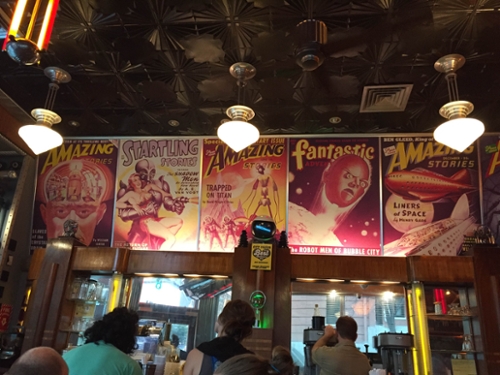Freedom of Information and Sri Lankan IDPs
This week I unfortunately don't have any pictures of Nobel Peace Prize winners. I also, very sadly, don't have any photos of the major celebrations that erupted in the wake of the Supreme Court's historic Obergefell v. Hodges decision last Friday. It would happen that the day I'm in the same city as the Court that handed down perhaps the most monumental decision in my lifetime so far, I would be sick in bed. Regardless, it's an exciting time to be in D.C. as conversations about racial tension, freedom of expression, marriage equality, and religious freedoms battle across the headlines.
At work, we hit the pause button on the webinar needs-assessment as INPROL shifts its focus on broader needs-assessments across the web platform. We will revisit the webinar needs-assessment likely in a few weeks. In the meantime, I've gotten to research the content of one webinar that would directly support USIP Afghanistan programming.
My supervisor and I had a meeting with a Senior Program Officer (SPO) who is helping design some of the Afghanistan programming. This meeting was informal, but allowed us to conduct an in-person needs-assessment of sorts. The SPO discussed how Afghanistan passed an Access to Information Law in December 2014. Such laws in theory provide the public with greater access to government information. The hope in Afghanistan is that the law will foster trust between the government and public. The SPO is specifically interested in how such laws are used to combat corruption, which has been the springboard for my research this week. I've been focusing on international and regional freedom of information standards and then narrowing in on how countries use such laws to either combat or bolster corruption (sadly some do the latter). My supervisor will review my findings later this week, and hopefully I would conduct more Afghanistan-specific research from there.
Last week I also attended a brownbag about the resettlement of women internally displaced persons (IDPs) in Sri Lanka. The Executive Director and Manager of the Consortium of Humanitarian Agencies in Sri Lanka both generously agreed to hold a discussion with USIP staff over lunch. Both had meetings at the Atlantic Council, the State Department, and the Brookings Institute, so I was very happy that they made the time to discuss their study of the resettlement process with USIP staff as well. The Sri Lankan civil war internally displaced around 460,000 people, and as of 2012, all but 1,400 had been resettled. The conversation helped me appreciate the gendered dimensions of the resettlement process, as the Consortium representatives described how the impacts of resettlement can be much more difficult for women. I was also reminded how, in the world of international development, one can't judge success necessarily by numbers - although the vast majority of IDPs have been resettled in Sri Lanka, negative impacts of the civil war linger and will continue to affect Sri Lankan society for the foreseeable future.
The Consortium representatives mentioned how things are made more difficult since the wounds of the civil war, which began in the 1980s, are so fresh. One USIP staffer mentioned how even 150 after the U.S.'s civil war, controversy still exists over war symbols and racial tension persists. I am, of course, speaking about the horrific attack on the Emanuel AME church in Charlston, South Carolina, last week. The conversation reminded me that the impacts of conflict are resilient, long-lasting, and exist across developmental spectrums. While my international law interest often immerses me in ideas about conflict resolution in other countries, I wonder what reconcilliation efforts would look like right here in the U.S.
Beyond USIP, I have had the opportunity to explore Baltimore, as it is a short drive or MARC train ride from D.C. I attended a Baltimore young professionals networking event with two William & Mary colleagues on Thursday and was invited to a cookout with several Baltimore immigration judges on Saturday. These events were great opportunities - I even met someone from the Department of Justice's Office of International Affiars, which helped me learn more about my career interests. And beyond work, it was fun to learn more about Maryland in general:


